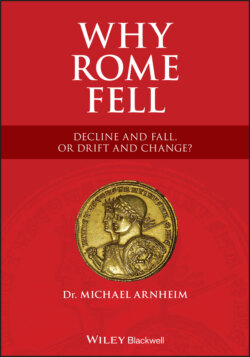Читать книгу Why Rome Fell - Michael Arnheim - Страница 33
Avoiding Julius Caesar’s Mistake
ОглавлениеAs an astute politician, Augustus took care not to make the same mistake that had cost Julius Caesar his life. Julius Caesar had ruled Rome as “dictator” for four years when he was appointed dictator perpetuo or dictator in perpetuum (literally, “dictator in perpetuity”, commonly translated as “dictator for life” but more accurately dictator for an indefinite period). Acceptance of this title signaled the end of the Roman Republic, which had lasted for 450 years under an elite to whom one-man rule was carefully eschewed except for brief emergencies. Julius Caesar’s position as dictator perpetuo posed a threat to this dominant minority, a number of whom, therefore, conspired to assassinate him on that fateful Ides of March, 44 BCE.
After his victory over Antony at Actium in 31 BCE, Augustus faced a serious dilemma. He was now master of the Roman world, but on what footing should his rule be placed? The title rex (king), which even Julius Caesar had refused, was anathema to the Republican aristocracy. But the title “dictator” was clearly also now off limits. The common people, who adulated Julius Caesar, had no objection to one-man rule, as was made clear in their outpouring of grief on Caesar’s assassination. Indeed, they wanted a strong leader to champion their cause. So the young Caesar’s game plan was to retain the support of the masses without offending the aristocracy, a daunting balancing act.
